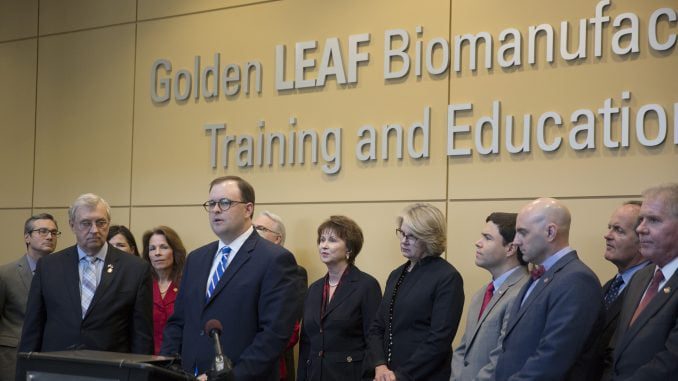
RALEIGH — A newly revamped North Carolina Teaching Fellows program is before the state legislature now after a coalition of the state’s top brass in education presented it at NC State’s Biomanufacturing Training and Education Center on Thursday.The new Teaching Fellows program provides up to $8,250 in a forgivable loan to students who agree to go into teaching special education or science, technology, engineering and math (STEM) in N.C. publicly-funded schools. These are the areas that are the most difficult for teacher recruitment. In 2015, 90 school districts reported having difficulty staffing high school math teachers.
Recipients of the loans would have 10 years to pay them back or they can teach in public schools for two years for each year of tuition. As an incentive to drive teachers to struggling schools, each year they teach in a low-performing school, one year of their loan is forgiven.
“We need driven, talented teachers in every single field … but science, technology, math and special education positions are particularly hard to fill because the job market is so strong here,” said UNC System President Margaret Spellings. “We see our strongest STEM graduates recruited before they even graduate. Having an incredibly rich technology industry is an boon to our state but a challenge to our schools.”
The program replaces the N.C. Teaching Fellows that the Republican-led legislature started phasing out in 2011 during the post-recession state budget recovery. At the time, lawmakers took a lot of heat for ending the scholarship program which awarded only four year scholarships to 500 high school seniors who would teach in any subject. They pledged to replace it with an updated one that addressed the current recruitment climate.”This is the fulfillment of that promise,” said Sen. Chad Barefoot (R- Franklin), who participated in a listening tour at universities with education leaders across the state over the last year. “Through much collaboration and good feedback we have arrived at a proposal that we are all strongly behind.”
One of the new proposals in the bill is an effort to pull people from other majors or other career fields into the classroom. An applicant may already have a bachelor’s degree in something other than teaching, or they may be changing their major to teaching from another field. Recipients can use the forgivable loan to finish their bachelor’s degree or earn their master’s degree in education. It’s a feature of the program that lawmakers hope will open teaching up to a wider range of professionals.
Bill sponsor Rep. Craig Horn (R-Union) considers it “fishing from a bigger pond” for a new generation of teachers.
“N.C. continues to experience a dramatic decline in teachers entering the profession,” said Horn. “Our most immediate need is in lower performing schools and in hard-to-fill subject matter such as science and math. Today we ring the bell for the teachers come on, we need you.”
The bill establishes the “North Carolina Teaching Fellows Commission,” which would select the recipients of the awards and identify the five most-effective teacher preparations programs in the state. The commission would be appointed by the N.C. General Assembly and will include academic deans, teachers, principals, a member from business and industry, and a local school board member.



